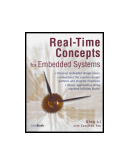Книга: Real-Time Concepts for Embedded Systems
14.5 Points to Remember
14.5 Points to Remember
Some points to remember include the following:
· An outside-in approach can be used to decompose applications at the top level.
· Device dependencies can be used to decompose applications.
· Event dependencies can be used to decompose applications.
· Timing dependencies can be used to decompose applications.
· Levels of criticality of workload involved can be used to decompose applications.
· Functional cohesion, temporal cohesion, or sequential cohesion can be used either to form a task or to combine tasks.
· Rate Monotonic Scheduling can be summarized by stating that a task's priority depends on its period-the shorter the period, the higher the priority. RMS, when implemented appropriately, produces stable and predictable performance.
· Schedulability analysis only looks at how systems meet temporal requirements, not functional requirements.
· Six assumptions are associated with the basic RMA:
? all of the tasks are periodic,
? the tasks are independent of each other and that no interactions occur among tasks,
? a task's deadline is the beginning of its next period,
? each task has a constant execution time that does not vary over time,
? all of the tasks have the same level of criticality, and
? aperiodic tasks are limited to initialization and failure recovery work and that these aperiodic tasks do not have hard deadlines.
· Basic RMA does not account for task synchronization and aperiodic tasks.
- Chapter 8. The Point-to-Point Protocol
- Chapter 4: Introduction To Real-Time Operating Systems
- Chapter 9: Other RTOS Services
- 1.4 Points to Remember
- 2.5 Points to Remember
- 3.6 Points to Remember
- 4.8 Points to Remember
- 5.7 Points to Remember
- 6.5 Points to Remember
- 7.8 Points to Remember
- 8.6 Points to Remember
- 9.4 Points to Remember




